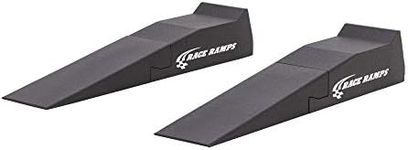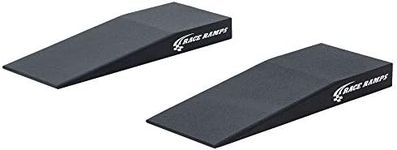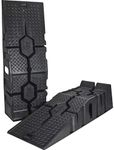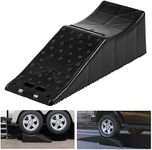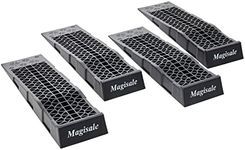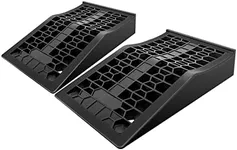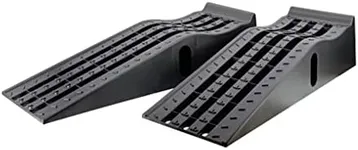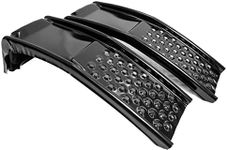Buying Guide for the Best Car Ramps
Choosing the right car ramps is important for both safety and convenience when working on your vehicle. Car ramps help you lift your car off the ground, making it easier to perform maintenance tasks like oil changes or inspections. When picking car ramps, you should consider the type of vehicle you have, the kind of work you plan to do, and where you’ll be using the ramps. Understanding the key specifications will help you select ramps that are safe, stable, and suitable for your needs.Weight CapacityWeight capacity refers to the maximum amount of weight the ramps can safely support. This is crucial because using ramps that can't handle your vehicle's weight can be dangerous. Weight capacities are usually listed per pair, so always check your vehicle's total weight (including any cargo) and make sure the ramps can handle it. Light cars can use ramps with lower capacities, while trucks and SUVs need ramps with higher ratings. Always choose ramps with a capacity that exceeds your vehicle's weight for extra safety.
Ramp Height and LiftRamp height or lift is the amount of elevation the ramps provide. This determines how much space you’ll have to work under your car. Lower ramps (around 6-8 inches) are good for basic tasks and vehicles with low ground clearance, while higher ramps (10-12 inches or more) give more room for bigger jobs or larger vehicles. Think about the kind of work you’ll be doing and how much space you need underneath your car to choose the right height.
Ramp Length and AngleRamp length and angle affect how easily your car can drive onto the ramps. Longer ramps have a gentler angle, making them better for cars with low ground clearance, as they reduce the risk of scraping the bumper. Shorter ramps are more compact but have a steeper angle, which is fine for vehicles with higher clearance. Consider your car’s front end and how low it sits to the ground when deciding on ramp length and angle.
MaterialCar ramps are typically made from plastic, metal, or a combination of both. Plastic ramps are lightweight and easy to move, but they’re best for lighter vehicles. Metal ramps are heavier and more durable, making them suitable for heavier cars and trucks. Some ramps combine both materials for a balance of strength and portability. Choose the material based on your vehicle’s weight and how often you’ll be moving the ramps.
Surface Grip and Safety FeaturesSurface grip refers to the texture or pattern on the ramp that helps prevent your tires from slipping. Some ramps also have raised edges or wheel stops to keep your car securely in place. These features are important for safety, especially if you’re working on a smooth or sloped surface. Look for ramps with good grip and extra safety features if you want added peace of mind while working under your car.
Portability and StoragePortability and storage are about how easy it is to move and store the ramps when not in use. Lightweight ramps are easier to carry and store, while heavier ramps may be more stable but harder to move. If you have limited storage space or need to transport the ramps often, consider compact or foldable designs. Think about where you’ll keep the ramps and how often you’ll need to move them to find the best fit for your situation.
